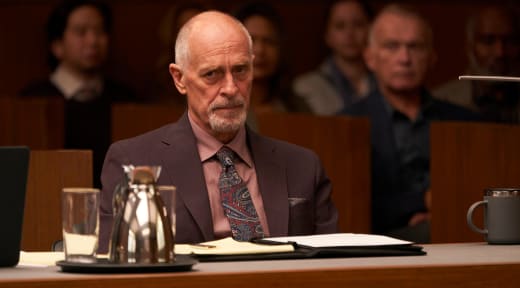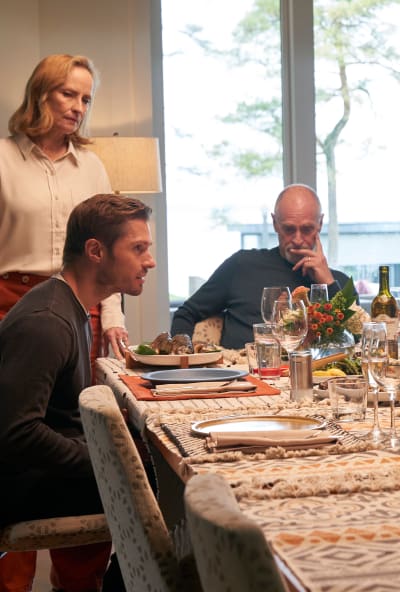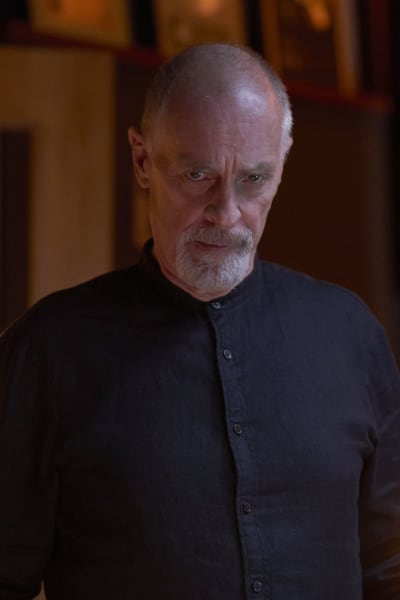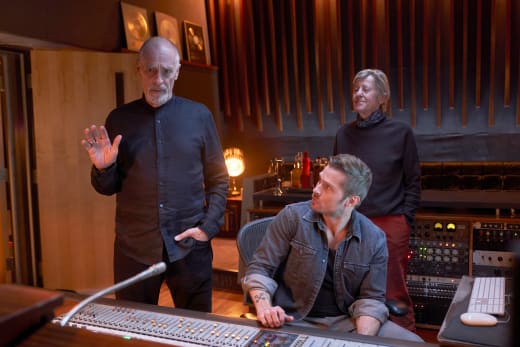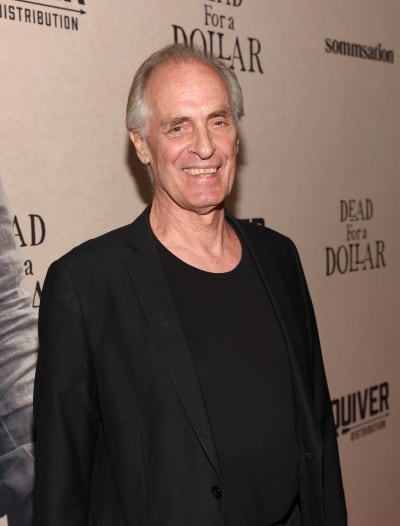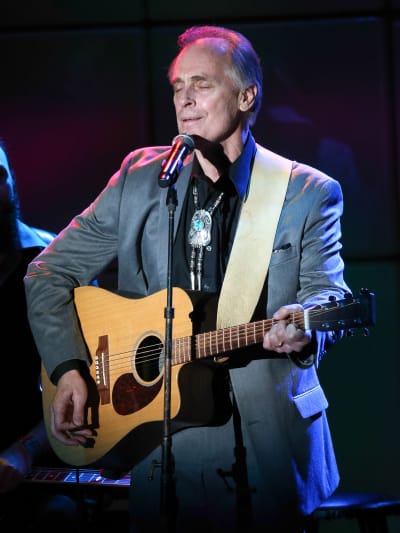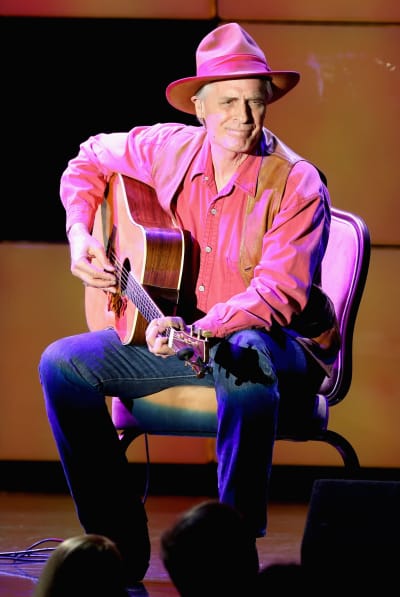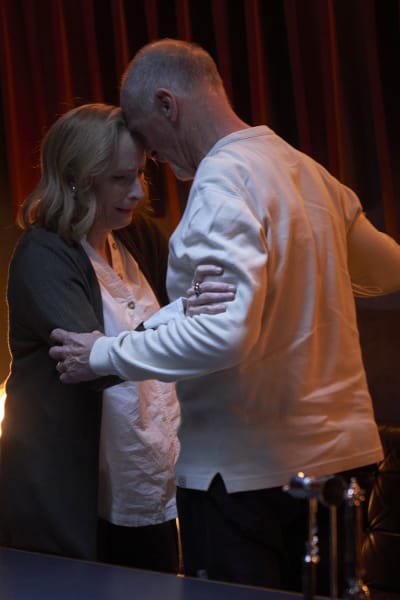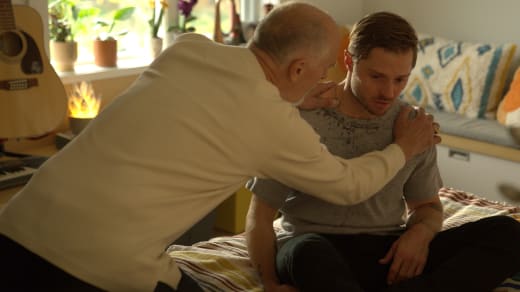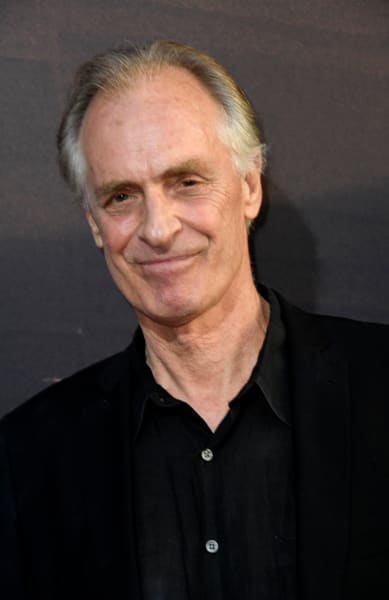Keith Carradine starred in the Accused Season 1 finale as Billy, an aging rockstar battling cancer who is adjusting to the news by planning his lasting musical legacy.
Billy’s attention is needed elsewhere, though, as his son struggles with addiction and ultimately dies of the disease when his wife chooses not to render aid, allowing, in her view, for her beloved son to find the peace he seeks.
Billy decides that as his life is coming to an end, he’ll claim responsibility so his wife can raise their granddaughter.
We had the chance to talk with Carradine about his role on Accused Season 1 Episode 15 and what it was like getting to share his musical talents with a viewing audience again.
This interview has been edited for clarity. Enjoy.
Hi, Keith. How are you today?
Good, thanks. How are you?
I’m good. It’s so lovely to meet you. I feel like I’ve grown up with you in my life, and here we are.
I hope that’s a good thing.
It is. It is a good thing. Good memories.
Good.
Billy’s story is a 40-minute American tragedy. How well do you think it represents what so many families are going through today?x
It seems to be very, very truthful, very honest, and incredibly relevant. Especially given the opioid issue that we’ve been dealing with now for some time in this country. The nature of addiction, the relationship between parents and an addicted child, all of these issues are incredibly relevant, and they’re kind of immediate.
I think that the writers, and Howard Gordon, and everyone involved at Fox, have done an extraordinary job of telling this story in particular, and I think all of the episodes.
What did you think when you first received the script?
Well, I was very excited. Particularly because it allowed me to dive back into some music onscreen, and I haven’t had a chance to do that in quite a while. I continue writing songs and doing that. I worked with Tanya Tucker recently, and she and I did a little Christmas movie. I wrote a song for that Tanya, and I went in and recorded it.
So I’ve kept my hand in musically, but I haven’t necessarily had a chance to do it on screen. And when this role came along, I grabbed it. I didn’t want to miss the chance.
It’s a very well-written script, and the production values are just top-notch. The story itself, the screenwriting, all of that lent itself to my wanting to take part. But in particular, the chance to tell this story, but also to play some music.
Absolutely.
That was exciting.
Is it your song?
No, no. It’s a funny thing about that. It’s become very difficult now for the songwriters and that process dealing with the studios. I wrote the song that I performed. I wrote a song that I performed in the film I did with Tanya.
The studios aren’t set up to be nimble in terms of dealing with a songwriter’s ownership of their material. It can get to be a real “Dance of the sand crabs,” as my music attorney used to say. With them trying to figure out who owns what and how to use it and all of that licensing rights.
It becomes such a complicated conversation. In fact, in this instance, it made much more sense for me to just back off and let Sony and Fox manage it.
And actually, Howard’s son, Micah, is a composer and a songwriter, and they have an arrangement. So Micah was able to do all the composing, and then he and I went in and recorded this stuff together. I think it turned out really well.
It really did. Did they write this song before you had the role or after? Because it suits you perfectly.
You know what? I think once they cast me, and I think that once they cast me in the role, they knew that there was going to be some musical stuff that would be a part of it.
I think that having cast me gave Micah, and Howard, of course, it gave them something to work from in terms of being familiar with my musical sensibility and the things that I’ve done musically.
So I think that they were able to use that and write to me. It felt that way the first time I went in with Micah. The first time they sent me the material, I thought, “Oh, yeah. It sounds like something I would’ve written.”
It really does. And so that leads me to this. Leo really wanted to resurrect this song with Billy. What the heck was wrong with Billy that he didn’t want to resurrect this song? Why was he so adamant to keep Leo out of that part of his life?
I think that that’s a father-son dynamic that I thought it was really interesting to explore. I think that from Billy’s point of view, I think he had a relationship to that song that he felt it was less than. It wasn’t up to his own idea.
As a songwriter myself, I know what that feeling is. I know what the feeling is to have written a song and then kind of look back on it. I mean, I have songs that I wrote 30, 40 years ago that I still like. I have other songs that I wrote 30, 40 years ago that I think are freaking dreadful.
Perhaps the lyric content, not necessarily the music structure, because I think for most of those, I had something going on. But some of those lyrics are very juvenile that I wrote 30, 40 years ago. And it’s not how I write now.
It’s not how I write now, knowing what I know now, having lived those years. I think that there was an element of that in Billy’s relationship to that song. I think that Leo, being a younger person, didn’t have that problem with that song and those lyrics, and he thought it worked. Now looking back, Billy should have listened to him.
Right.
Because a lot of times, especially now, the kids know a lot more than we do.
Good point.
We might think something’s not up to it, but listen to the kids, man, they’ll tell you. A lot of times, they’re right.
It broke my heart, especially whenever Billy’s wife Anne said, “You’re putting your music legacy ahead of your family legacy.”
Yes.
And it seemed to me that Leo was hanging on by a tether, and part of that tether was related to his father’s music. He thought that if he could reach his father in that way, maybe it would give him a reason to live. What do you think Billy was thinking when it was all said and done, looking back at that moment?
Listen, for a person to pursue that avenue creatively, that Billy has pursued his entire life, it can be all-consuming. The level of narcissism required to do that; you can go too far.
Right.
And I think that ultimately, Billy’s consciousness of his failure in that regard had a lot to do with the choices that he makes at the denouement of the story.
Up to the point of Leo’s death, it seemed like Billy and Ann did everything they possibly could to get him through and to reach him except to let him go. Which is what Ann ultimately wanted to do.
Yes.
What kind of discussions did you have on set about that story and that particular ending?
Well, we had the conversations that you might expect us to have. How do we, as actors, connect with the choices that these characters are making? How do we do that in a way that feels truthful and honest and that we can believe ourselves as we’re playing the roles?
That’s the conversation that gets had. I think that we all had that conversation together as we were doing the work and arrived at a place where we could give the performances and feel that we were being honest and truthful in the course of that.
Do you have any idea how many takes it took to get that particular scene right? Because it seems like it would be really emotional and hit the right notes, and you both hit them perfectly.
I’m glad to hear that. I’m glad you feel that way. I haven’t seen the cut. So I know that we did several takes from every angle. I’ll be interested to see which choices they made in terms of what we all did, what I did in particular.
I hate watching myself. I will watch this because I think it deserves it. I would like to watch it. But I know that when I see it, I’ll spend the first time I watch it doing nothing but looking at myself and criticizing everything I do. That’s how we actors are. And I’m no exception. I’m as vain as the next one.
I will look at it and feel as though why did they use that take? But I’ll be interested to see what choices they made. I remember the performance of it, and I remember feeling in it at the time and feeling as though we were all being honest and truthful.
I remember one scene working on Dexter with Jennifer Carpenter, and she was opposite of me. We were doing a scene together, and we finished a take. She said, “I need to do that again. I was lying.”
I’ve never forgotten it. It was so honest. I did feel as though that Laila [Robins, who played Billy’s wife, Anne]and I were able to get through our takes, and neither of us ever felt as though we were lying at any point. So that was good.
How does being a father affect how you portrayed yourself in this role?
Well, it’s everything. I mean, obviously, the actors can pretend to be parents, but those of us who actually are might have a leg up in that regard.
And did you think, while you were filming this, to what point you would take things if you were trying to save your child in that same regard?
Well, in the course of the playing of it, I felt that it was written honestly in that my wife is able to let go in a way that I’m not. That felt right to me.
I did feel as though confronted with something like that in my own life, I would’ve probably kept trying, futilely, and to no end. To perhaps a more destructive end in terms of everything that follows.
Well, then, it was a perfect role for you since he would’ve kept trying as well.
Maybe so.
You can watch all of Accused Season 1 now streaming on Hulu.
Carissa Pavlica is the managing editor and a staff writer and critic for TV Fanatic. She’s a member of the Critic’s Choice Association, enjoys mentoring writers, conversing with cats, and passionately discussing the nuances of television and film with anyone who will listen. Follow her on Twitter and email her here at TV Fanatic.

